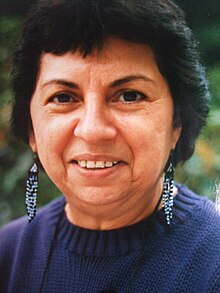Gloria Anzaldúa
1. How has Gloria Anzaldua’s race and sexual orientation contributed to her writing? How have these obstacles she’s faced shaped her thoughts and outlook on society? Does this relate to any previous writers we’ve talked about whether in this section or the previous?
2. (319) “Write with your eyes like painters, with your ears like musicians, with your feet like dancers. You are the truthsayer with quill and torch. Write with your tongues of fire. Don’t let the pen banish you from yourself. Don’t let the ink coagulate in your pens. Don’t let the censor snuff out the spark, nor the gags muffle your voice. Put your shit on the paper.”
-What do you believe Gloria is stressing to her audience? If every woman throughout history had done this, how could the world be different? Would women’s position in society be different?
3. (323)In the very last paragraph Gloria writes, “Find the muse within you. The voice that lies buried under you, dig it up. Do not fake it, try to sell it for a handclap or your name in print.”
-What do you believe she meant by the term, “faking it?” What does this term mean to you and what are some examples in today’s world of people, “faking it?” Why do you believe people do this?
4. (322) “It’s not on paper that you create but in your innards, in the gut and out of living tissue - organic writing I call it. A poem works for me not when it says what I want it to say and not when it evokes what I want it to. It works when the subject I started out with metamorphoses alchemically into a different one, one that has been discovered, or uncovered, by the poem. It works when it surprises me, when it says something I have repressed or pretended not to know. The meaning and worth of my writing is measured by how much I put myself on the line and how much nakedness I achieve.”
-How does this quote reflect the vulnerability women show? What does it say about our writing techniques as compared to the men’s style that we’ve discussed in class? Does this affect the quality of their writing? If so, how? If we aren’t vulnerable, what would our writing look like?
5. (321)” It’s too easy, blaming it all on the white man or white feminists or society or on our parents. What we say and what we do ultimately comes back to us, so let us own our responsibility, place it in our own hands and carry it with dignity and strength. No one’s going to do my shitwork, I pick up after myself.
It makes perfect sense to me now how I resisted the act of writing, the commitment to writing. To write is to confront one’s demons, look them in the face and live to write about them. Fear acts like a magnet; it draws the demons out of the closet and into the ink in our pens.”
-What does this quote tell us about how she views women in the past? What demons is she referring to? What is she suggesting we do to change our future? What demons is she referring to?
6. (319) “Why am I compelled to write?... Because the world I create in the writing compensates for what the real world does not give me. By writing I put order in the world, give it a handle so I can grasp it. I write because life does not appease my appetites and anger... To become more intimate with myself and you. To discover myself, to preserve myself, to make myself, to achieve self-autonomy. To dispell the myths that I am a mad prophet or a poor suffering soul. To convince myself that I am worthy and that what I have to say is not a pile of shit... Finally I write because I'm scared of writing, but I'm more scared of not writing.
Why should I try to justify why I write? Do I need to justify being Chicana, being woman? You might as well ask me to try to justify why I’m alive.”
-How does this quote relate to our society today? Why do we write? As a class? Individually? How does this relate to women in history going through difficult times?
7. In her letters to these third-world women, Gloria Anzaldua starts off in each section by mentioning how she’s either laying naked in the sun, in her comfortable bed or taking herself to pizza, luxuries these women may not have. Do you feel as if this is intentional? If so, how do you feel this ties in with the concept of the reading?

No comments:
Post a Comment